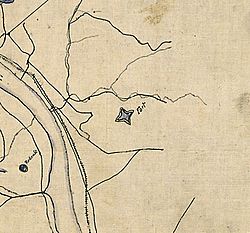Fort Black facts for kids
Quick facts for kids Fort Black |
|
|---|---|
| Greenfield, Pittsburgh | |

Fort Black is marked "Fort" in this map.
|
|
| Coordinates | 40°25′08″N 79°56′27″W / 40.4188°N 79.9407°W |
| Type | Fort |
| Site history | |
| Built | 1863 |
| Fate | No remains |
Fort Black was a special kind of building called a fort. It was also known as Fort Squirrel Hill or Fort Chess. This fort was built in 1863 in a part of Pittsburgh, Pennsylvania, called Greenfield. Back then, this area was considered part of Squirrel Hill.
Fort Black was built during the Civil War. This was a big war in the United States between the northern states (the Union) and the southern states (the Confederacy). The fort's main job was to help protect Pittsburgh from attacks by the Confederate soldiers.
Contents
What Was Fort Black?
Fort Black was located on Bigelow Street. This street used to be called Squirrel Hill Road. The fort was positioned between Parade and Shields streets. It had powerful cannons that pointed towards an important area called the Point. This was where two rivers met.
Protecting Pittsburgh
To keep soldiers safe, the fort also had trenches. These were long, narrow ditches dug into the ground. They gave soldiers cover during a fight. Fort Black was one of the largest forts built around Pittsburgh at that time. There were 27 forts in total!
Like most forts built during the Civil War, Fort Black was made from big mounds of dirt. These dirt walls were strong enough to stop cannonballs.
Where Was the Powder?
Close to Fort Black, there was another important building. It was called a powder magazine. This was a safe place to store gunpowder. Gunpowder was needed for the fort's cannons. This magazine was located on Beechwood Boulevard.
When Was Fort Black Built and Gone?
Fort Black was built very quickly in 1863. It was a vital part of Pittsburgh's defenses during the Civil War.
The End of the Fort
The fort stood for many years after the war ended. However, it was eventually taken down. Fort Black was completely demolished in 1928. Today, there are no remains of the fort left.

